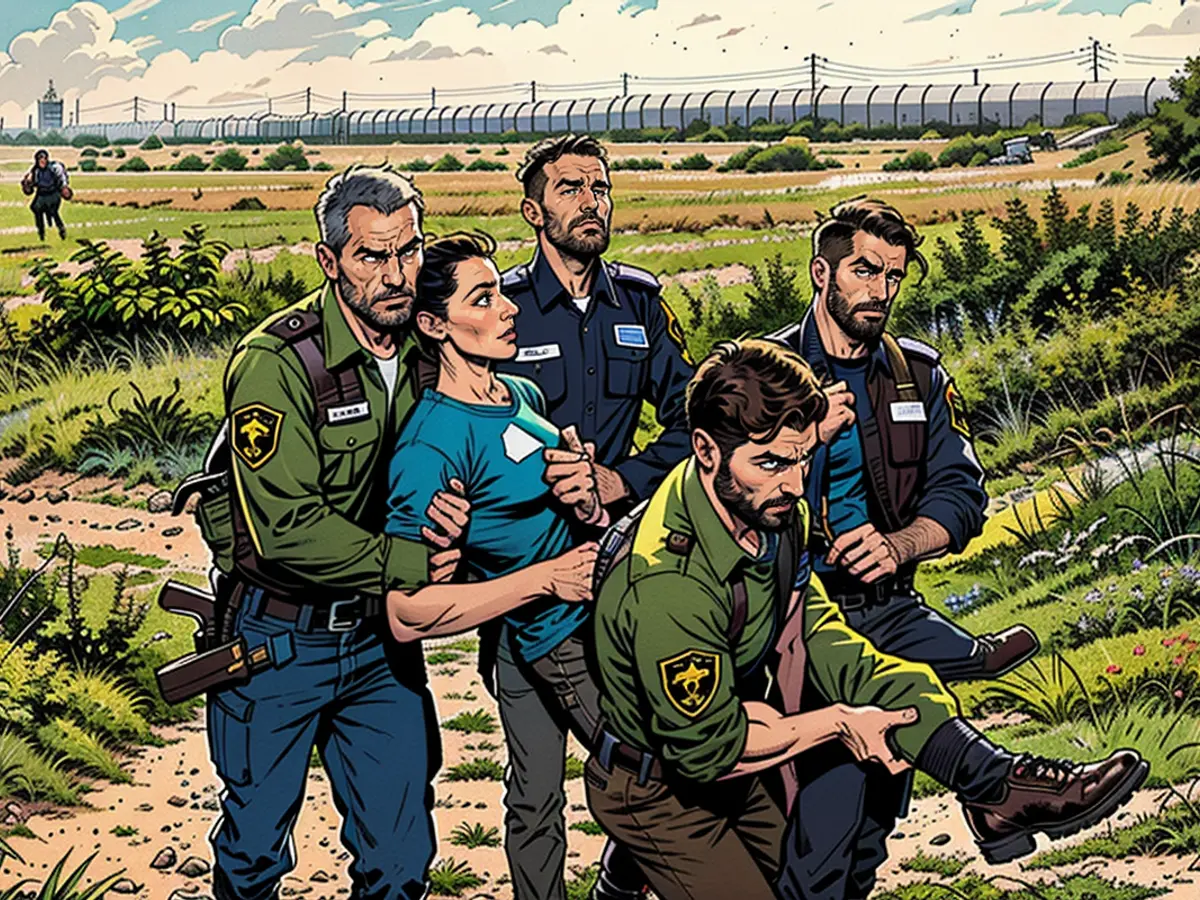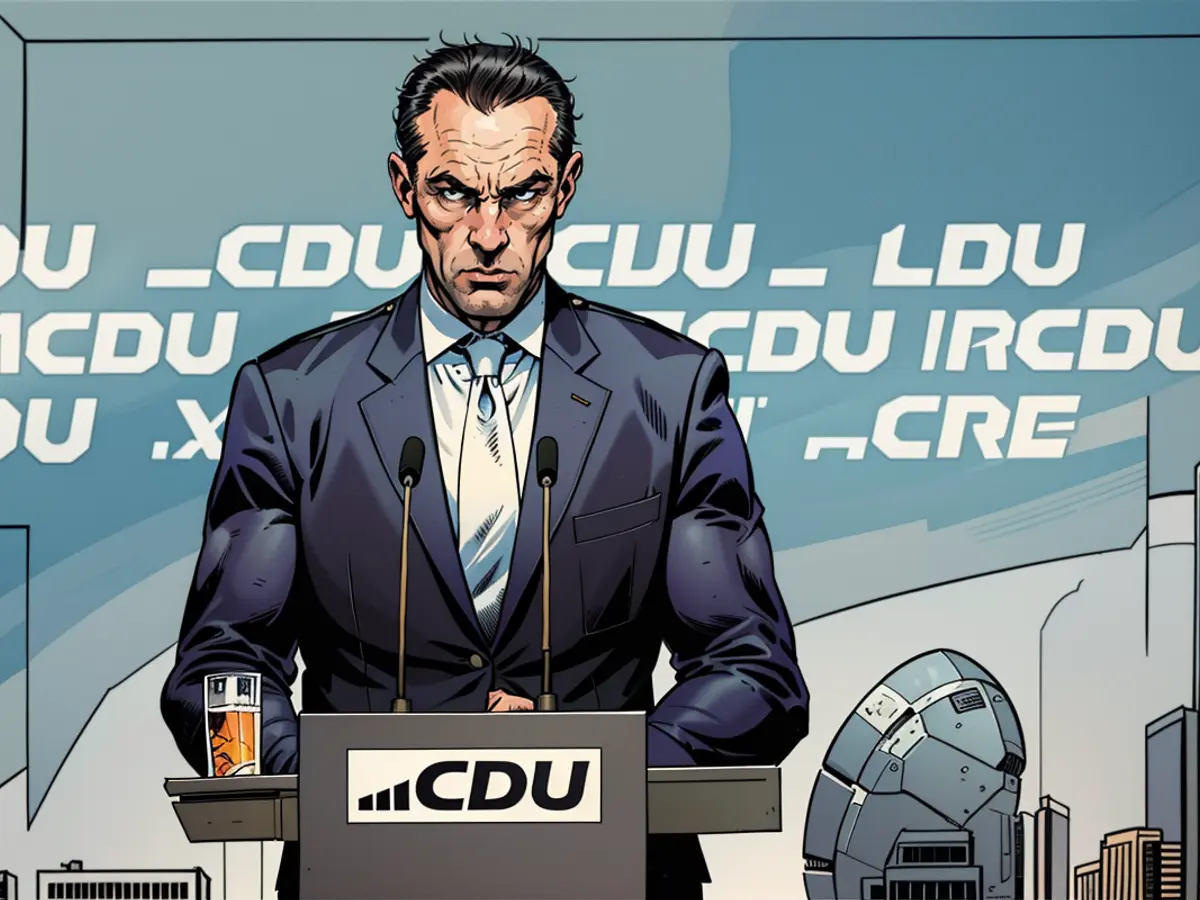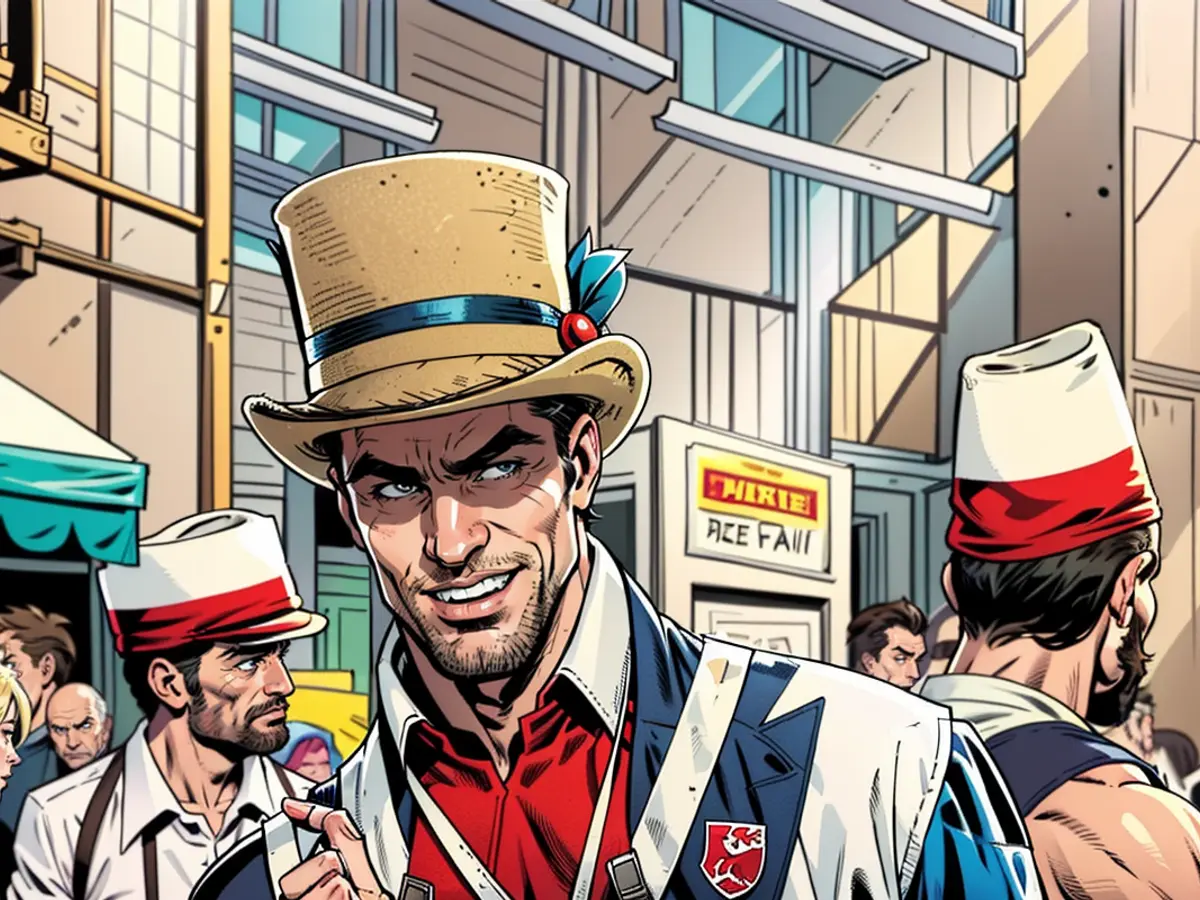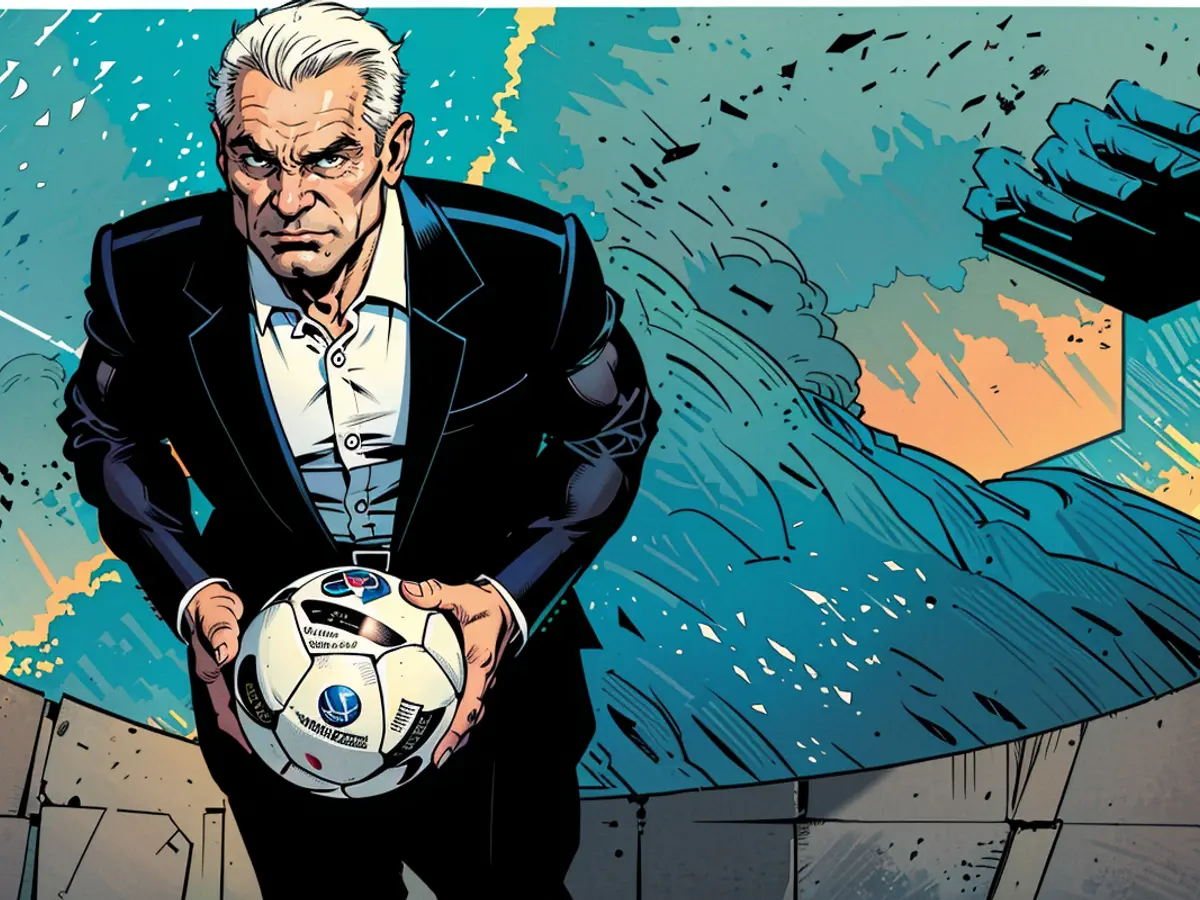Scholz warns of potential harm to Germany's clout in Europe.
There's no major leadership role in Europe, and tensions with France are increasing: Terry Reintke expresses her concerns with German Chancellor Olaf Scholz during an interview with ntv.de. As the Greens' top candidate for the European elections, she calls for "a sign of European solidarity" prior to her meeting with President Emmanuel Macron and suggests her own ideas on the matter. Additionally, Reintke shares her predictions for her party's performance in the European elections and the conditions under which the Greens would back Commission President Ursula von der Leyen's re-election.
ntv.de: During the "Frühstart" segment on ntv, Robert Habeck set a target of "full double-digit results" for the Greens in the upcoming European elections. Could you clarify what you mean by "full"?
Terry Reintke: Instead of focusing on definitions, I'd rather concentrate on achieving a strong Green result in these elections. We're in the heat of the campaign, and the atmosphere is supportive. I'm not just talking about Germany, but about other member states as well. In 2019, the Greens were particularly dominant in Western and Northern Europe. Conversely, we made little impact in the south and east of the EU. We've been working hard to alter this situation. This time, we hope to have MEPs from more countries in the Green Group at the European Parliament than we did before.
The Greens achieved a record 20.5% share in the 2019 elections in Germany. In the latest RTL/ntv trend survey, your party stands at 14%. Do you anticipate more consistent support from your electorate in the European elections than voters from other parties?
The election turnout was also remarkable in 2019, so we're determined to achieve a similar level this time. We're committed to rallying people - but above all, we want to make an appeal to a diverse group. People who advocate for strengthening democracy and oppose a right-wing shift. These issues resonate far beyond a supposed core constituency.
Surveys suggest increased interest in the European elections. Does this surprise you?
No, it's understandable. The EU influences many aspects of our daily lives and, until recently, appeared to be a natural progression towards more European integration. Now, however, democracy and human rights are at risk of being dismantled, and a war is raging in Europe. The recent tumultuous years have demonstrated the importance of the EU for Germany's economy and security. I believe that many people grasp the benefits that the EU confers.
Without the Green Party's strong result in 2019, what would not have been possible?
The Commission wouldn't have proposed the Green Deal, which aims to make Europe climate-neutral, nor would we have enacted the significant legislative initiatives in this area. This extends beyond merely meeting the Paris climate targets and encompasses Europe's competitiveness and the question of whether emerging technologies - and consequently, jobs - will be located primarily in Europe, the United States, or China. Our efforts have made a significant difference. Surveys predict that the current parliamentary majority of Conservatives, Social Democrats, and Liberals will only possess a tenuous majority after the election. Should these parties form an alliance with the EU adversaries of the ECR group in the future, many things - including the Green Deal - could be in peril, detrimentally affecting both the economy and the environment.
The Greens are being proposed as a potential coalition partner, but they're demanding the retention of the Green Deal as a condition. Is this not tantamount to allying with right-wing parties, like Giorgia Meloni's Fratelli d'Italia party?
Europe's future and our prosperity are in peril. If parts of the CDU/CSU are now pushing for a reversal, this poses a threat to Germany as a business hub. Several trade organizations have voiced concerns about a shift in the Green Deal's direction. The path to climate neutrality - and, consequently, our companies - necessitates a stable investment framework. As someone from the Ruhr region, I'm aware of the challenges as well as the opportunities involved in a transformation. When I was a child, coal trains were ubiquitous; today, the focus is on green steel and hydrogen.
Following Commission President Ursula von der Leyen's indication that she's open to a debt-financed investment program in the new legislative term, Finance Minister Christian Lindner (and likely her own party) aren't pleased. Is she attempting to court the Greens?
Ursula von der Leyen is addressing the requirements, and it's understandable that we Greens are pushing for a new program, similar to the NextGen Fund established in the wake of the coronavirus pandemic. Numerous companies have already embarked on this course and desire climate-friendly production. However, this necessitates planning and comprehensive financing that the private sector cannot deliver alone. Investments are being pursued elsewhere; the United States has introduced programs worth billions under the Inflation Reduction Act. The fact is that green steel will be produced in the future; the question is, will it be forged in Germany? I personally believe it's appropriate that Ms. von der Leyen is aware of the economic concerns. I hope she can persuade her doubters within the party.
Even though you're young, you've been a part of the European Parliament and witnessed two and a half federal governments. Germany is seen as a great European. But how does Olaf Scholz and the coalition government appear from the perspective of Brussels?
There's room for improvement. From Brussels, it's essential that Germany remains a trustworthy partner with strong European leadership. This involves advocating for German interests in Europe while also keeping Europe united. Unfortunately, Germany has recently been noticeable for changing its position at the last minute or refusing to agree after years of negotiations. I'm concerned that Germany's image and power in Brussels - which is crucial, especially at the negotiating table - are fading. Olaf Scholz needs to better fulfill his responsibility of leading Europe. Otherwise, he risks losing Germany's influence in the European Union.
Has the overall influence of Germany on the fate of the EU decreased?
Many people in Europe would like their continent's most populous and economically strongest member state to take on more European leadership responsibilities than they have in the past. This doesn't indicate issuing rigid declarations, but rather a common vision for the continent and leading initiatives. Even if they're not implemented entirely, they can serve as a starting point. The Schengen Agreement and the euro are prime examples of Franco-German initiatives. However, there's been a lack of new impetus in Berlin. For instance, in the German Vote, Germany refused to agree to intricately unified laws like the Supply Chain Act. Berlin has also failed to take a clear stance on other legislative initiatives.
What kind of message do you expect from the meeting between Macron and Scholz on Tuesday?
It's essential to project a harmonious tone, not a discordant one. We need this in these tumultuous times. We're dealing with significant common challenges. We'll only be able to represent our interests and values convincingly if we're capable of acting geopolitically. Some of the issues include further steps toward integrating our foreign and security policies and addressing the unanimity principle, allowing countries like Hungary's Prime Minister Viktor Orban to constantly hold other countries hostage with veto threats. We also need progress on cooperation for armaments policy, like more efficient procurement or the compatibility of weapons systems. That was a demand in the turnaround, and there's still a lot of room for maneuver.
Regarding the Greens' proposal for a separate financial instrument for the armaments sector outside the EU budget, what do they really mean?
It's about bolstering Europe's security. We propose combining parts of national armament budgets and investing in joint armament projects and joint procurement initiatives, such as increasing ammunition stockpiles. Combining funds could make our armaments more efficient and make us stronger through international cooperation.
You mentioned the establishment of an EU Council of Defense Ministers or even a Commissioner for Defense. What's your opinion?
I'm open to both ideas. Though appointing a Defense Commissioner wouldn't instantly promote cooperation between EU capitals, it could grant them more power and influence if given their own defense budget. The establishment of such an office must be connected to a specific project, such as making security and defense policy more European.
The Greens' election manifesto condemns the use of cluster munitions, including in Ukraine. Isn't that hypocritical? They're criticizing weaponry use after allowing Ukraine to starve for ammunition and then dictating what weapons they may use?
We support Ukraine financially and militarily, but we don't endorse every weapon system unreservedly. Germany and many other EU countries have committed to banning cluster munitions, no matter where they're used. We're major supporters of Ukraine today, and we'll continue to assist them. Yet, curtailing the development aid budget in 2025 - as the German government did this year - seems to undermine Germany's pledge to help other countries transform.
Climate collaborations are necessary actions that need to be supported financially. These partnerships aren't acts of charity, but strategies for addressing climate policy issues on a global scale. Europe holds a significant responsibility regarding the climate crisis. Furthermore, European initiatives won't be effective if other nations decline to participate. Inaction could result in greater expenses later on. The current climate catastrophe is evident in the rise of extreme weather incidents, like the recent one in Saarland.
However, people are revisiting the idea of holding back funds for foreign investments, including the finance minister of the Federal Republic of Germany, Christian Lindner, who pointed to Peru's bike paths as a reference.
This discourse emerges periodically. While budget cuts make it difficult to provide funds for international projects, we must comprehend that we reside in a global competition for influence. China is clearly investing in various countries, steadily gaining access to resources and trade routes. If we remain inactive, we'll cut off potential sources of raw materials. Furthermore, ignore global conflict zones at your own peril as they may disrupt our supply chains, jeopardize our lives, and damage our economies. The idea that our world only extends to Europe's external borders is a narrow perspective. And during a period where autocracies are trying to undermine democracies worldwide, this would be a risky option.
Sebastian Huld sat down with Terry Reintke to discuss these topics.
Read also:
- Year of climate records: extreme is the new normal
- Precautionary arrests show Islamist terror threat
- UN vote urges Israel to ceasefire
- SPD rules out budget resolution before the end of the year
Source: www.ntv.de






